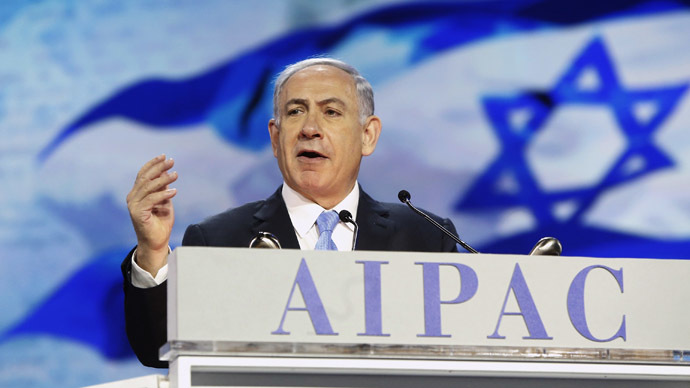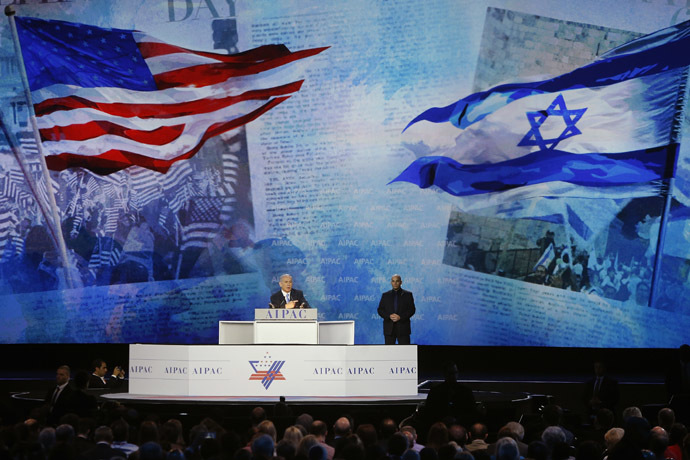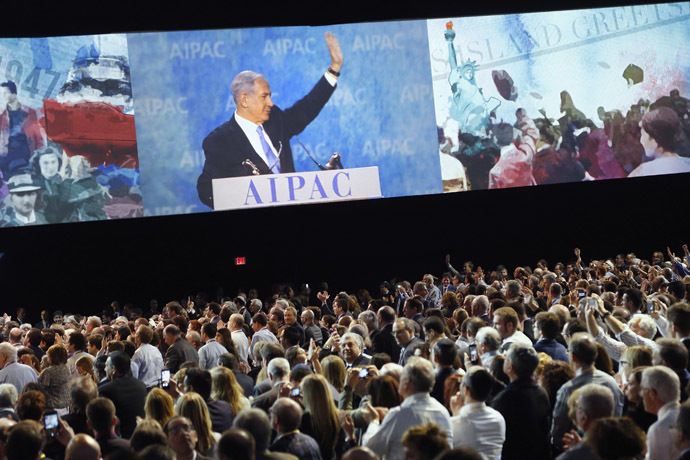Netanyahu to AIPAC: US-Israel relations are ‘stronger than ever’

Israeli Prime Minister Benjamin Netanyahu reassured attendees of the American Israel Public Affairs Committee's annual policy conference that Israel and the US are "like a family," saying "our alliance is strong."
“You’re here to tell the world that reports of the demise of Israeli-US relations are not only premature, they’re just wrong,” Netanyahu said Monday in Washington.
“You’re here to tell the world that our alliance is stronger than ever.”
Netanyahu’s speech comes a day before his controversial address before the US Congress, an appearance in which the Israeli prime minister will speak out against negotiations regarding Iran’s nuclear program. On Monday, he just slightly touched upon the topic of Iran calling it “the foremost state sponsor of terrorism in the world,” saying there must be no way Iran achieves a nuclear weapon.
Netanyahu: "In a dark and savage and desperate Middle East, Israel is a beacon of light and hope."
— U.S. Dept. of Fear (@FearDept) March 2, 2015
Netanyahu brushed off any criticism of the congressional address as he thanked both Democratic and Republican members of Congress for their consistent support of Israel.
Those congressional supporters, he said, have Israel’s “boundless gratitude.”

Netanyahu said that in his Tuesday speech before Congress, he would not attack US President Barack Obama, a man Netanyahu said he had much respect for, as well as the office of the US president.
“Both Democratic and Republican presidents have worked together” to support Israel, in providing vital defense funding and prime trade opportunities, he said.
#Netanyahu speech will push #Tehran closer to bomb – former Israeli security commanders http://t.co/A0l9D5ZuUwpic.twitter.com/lc0qYwiJGg
— RT (@RT_com) March 1, 2015
Israel should always remain a bipartisan issue, he added.
“Working together has made Israel stronger. Working together has made our partnership stronger," Netanyahu said, in part a nod to the work AIPAC has done in recent decades to build support for Israel in Washington.
Views of Netanyahu among Americans are generally positive. A new Gallup poll found that 45 percent of American respondents said they view Netanyahu favorably, while 24 percent view him unfavorably. Sixty percent of Republicans were positive about the prime minister, as well as 45 percent of political independents and 31 percent of Democrats.
A new Pew poll also reported strong favorability for Netanyahu among Americans.
53% of Republicans have favorable view of Netanyahu compared w/ 28% of Democrats http://t.co/RB765KzxZcpic.twitter.com/K8JeEnmOxy
— Pew Research Center (@pewresearch) March 2, 2015
A new Wall Street Journal/NBC News survey, meanwhile, found that 48 percent of respondents said Republicans on Capitol Hill should not have invited Netanyahu to speak to a joint session of Congress without first notifying President Obama.
The Israeli prime minister has said he believed the “two-party leadership” of Congress had invited him, but congressional aides said they knew of no congressional Democrats who had been consulted, according to reports.
Several congressional Democrats have said they would skip Netanyahu's Tuesday address, according to The Hill. Those members include civil rights pioneer Rep. John Lewis and Sen. Patrick Leahy, who called the scheduled speech a "tawdry and high-handed stunt."
Many objectors said the speech was nothing more than a campaign booster for Netanyahu, as he faces reelection at home on March 17.
“I intend to watch his speech about Iran from my office, but I have strong objections to using the floor of the United State Congress as a stage for his election campaign — or anyone's for that matter," Democratic Sen. Martin Heinrich said in a statement.
President Obama, meanwhile, has refused to meet with the Israeli PM during his visit, while Vice President Joe Biden and Secretary of State John Kerry are both abroad.
The US and Israel have been at odds over the Iran’s nuclear
program: Washington seeks to allow some nuclear activity for the
country, while Tel Aviv opposes Tehran’s nuclear program
altogether.
Last week, Netanyahu came under fire from Washington’s UN envoy Samantha Power and National Security Advisor Susan Rice, who both decried his decision to speak at the Congress without the official permission from the presidential administration.
In particular, Rice said the partisanship caused by Netanyahu's looming address was "destructive to the fabric of US-Israeli ties."
Kerry has warned against public discussion of the ongoing nuclear talks between the US and Iran as part of the P5+1 negotiating group, as this might damage the process aimed at preventing Tehran from developing nuclear weapons, AP reported.

“We are concerned by reports that suggest selected details of the ongoing negotiations will be discussed publicly in the coming days,” Kerry said from Geneva on Monday.
“I want to say clearly, doing so would make it more difficult to reach the goal that Israel and others say they share in order to get a good deal. Israel's security is absolutely at the forefront of all our minds but rightly so is the security of all the other countries in the region, so is our security in the United States.”
As The Intercept reported Monday, Netanyahu has repeatedly sounded the alarm over Iran's supposed impending nuclear weaponry for the last two decades. One of those instances came during a speech during a joint session of the US Congress in 1996.
“If Iran were to acquire nuclear weapons, this could presage catastrophic consequences, not only for my country, and not only for the Middle East, but for all mankind,” Netanyahu said.
“The deadline for attaining this goal is getting extremely close,” he added.












